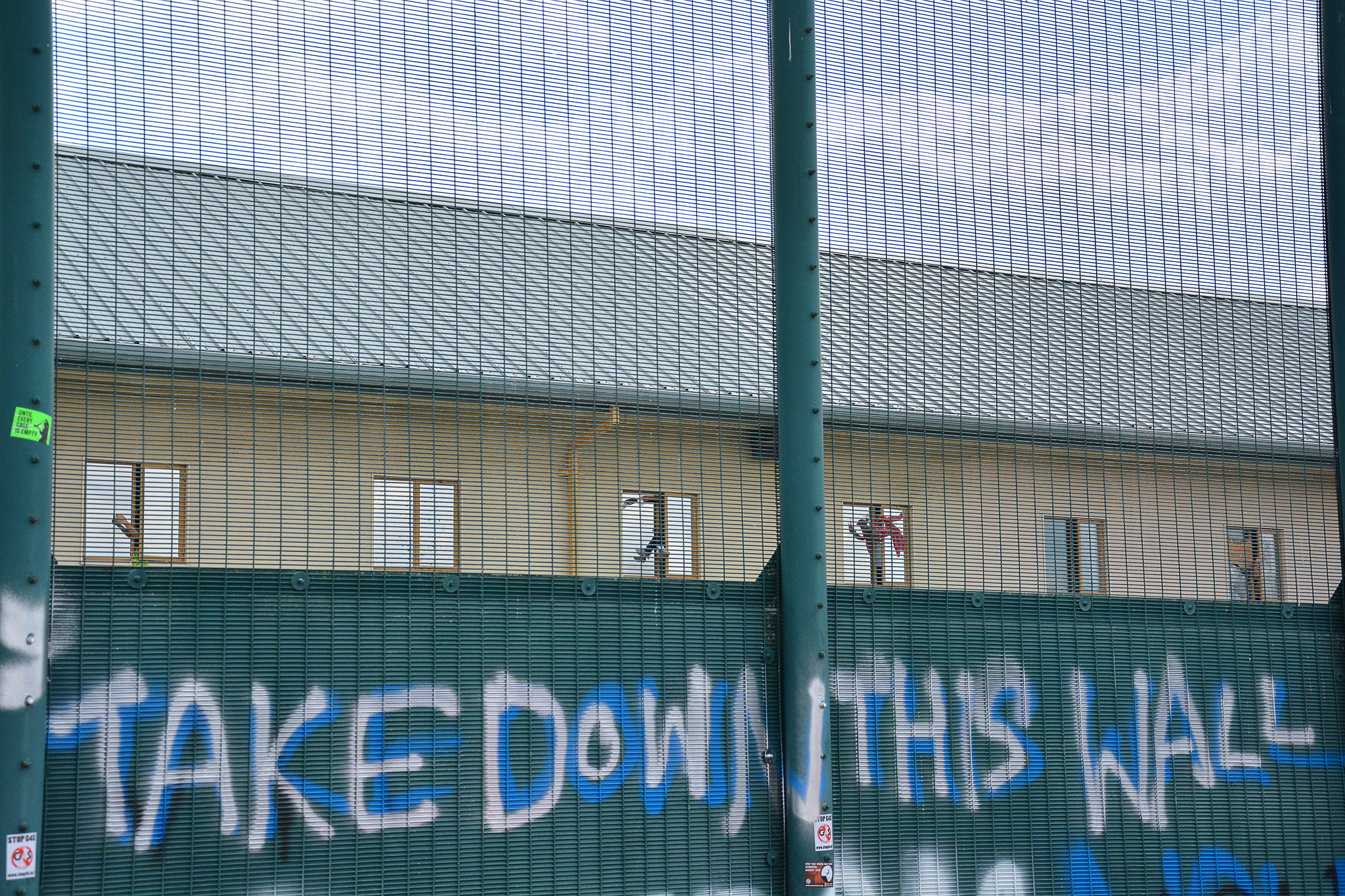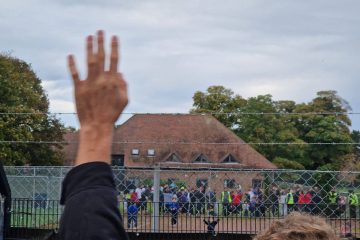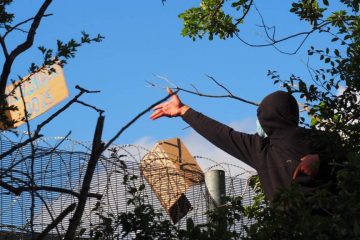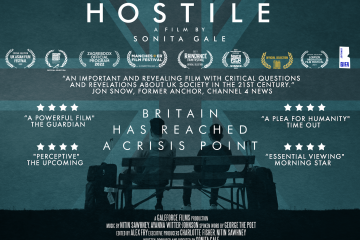“How can it be your job to be that cruel?”: Sylvie’s Experience of Being Detained at Yarl’s Wood

SDS member I.K. speaks to fellow SDS member Sylvie about her journey through the UK’s cruel immigration system and the nine months she spent locked up in Yarl’s Wood in 2002. Recently, Yarl’s Wood has been used to detain men and boys who have arrived across the English Channel. We learned recently that the Home Office intends to start detaining large numbers of women there again.
I.K.: How would you describe your time in detention? What surprised you about the experience?
Sylvie: I came here in 2002 and claimed asylum. I don’t think I had good advice. The Home Office invited me for an interview but I did not get their letter, and my lawyer told me that if I do not get the letter I should not go. Normally you send your story and after that they invite you to an interview – mainly to dig a hole in the story – but I did not have that opportunity. They refused my application, and when I appealed it was not successful. And I found myself homeless. I started writing to the Home Office about my situation, my struggle, but I never heard back. I also gave them the address of my friend, who I was staying with, [so that they had an address to respond to]. Then I got fed up and one of my friends took me to the police station where they then arrested me.
I.K.: Wait, your friend took you to the police?
Sylvie: It wasn’t that they took me. I went to the police to show them that I was not very well, [that I needed support]. Somebody came and assessed me and at the end of it they said I was not depressed, and that’s when my journey to detention started. I stayed in the police station for a few hours. Then people came and took me in a van to Yarl’s Wood detention centre. I ended up staying nine months in detention.
My visit to the police station was a good opportunity for them to get rid of me. Maybe I thought that when I went to the police they would see how desperate I was, how unwell I was. Because if I was well, in the right frame of mind, I would not be going to the police station.
What surprised me about the experience? That they were cold, that they do not care about [any]body. Keeping me there for nine months, trying to remove me four times was cold. That’s what surprised me about my experience. Because when people say that they are fleeing war in their place, being in detention here and fleeing war is not different. The treatment is the same because they are treating people the same way, as bad as back home. There’s no difference. The way they treated me was horrible. They used handcuffs on me. They put me on the plane knowing that I spent a week or two without having a bath. The clothes I wore were not washed, I was not washed. They put me on the plane, they saw me naked, even if stripped off they’d put clothes on you and beat you up. And when they were taking me on, I did not have underwear on. I did not comb my hair for the whole nine months in detention. Do you know how somebody can be in that situation, and they don’t care? Does that make sense?
I.K.: Yeah, it’s not just disappointing, it’s horrifying!
Sylvie: Horrifying!
I.K.: It’s almost unbelievable how cold they can be, because even though that’s their job…how can it be your job to be that cruel? How can you not see someone suffering?
Sylvie: They don’t treat you like a human being. Imagine, you were not after that person, that person has not absconded, that person has come to you, and you don’t give that person the fair opportunity to fight for their case. It was horrible. They were laughing at me. They beat me up four times when they were putting me on the plane, and the officer was horrible to me, asking us to go back to our country, saying we are using taxpayer money.. And it came to a time where I wanted to kill myself. In detention I was ready to hang myself. And I think that was when somebody, maybe one immigration officer, decided to release me. Because I would have died in detention.
Sylvie: They had even taken me to the Cameroonian Embassy. When my solicitor heard that they’d taken me there, it became another argument. The Home Office was putting my life in danger.
I.K.: So it helped build the legal case?
Sylvie: It helped build the case in such a way that, they knew the Home Office had put my life in danger by taking me to the Cameroonian Embassy by telling them here and that I’ve claimed asylum. You don’t do that. It’s against the law. Wow, *laughter.*
I.K.: I’m so sorry you’ve had to experience that. Hopefully the work that SDS and others are doing really starts to push things forward.
I.K.: So you were saying you were treated by officers in a really cold and dehumanising way. Was it specific officers or did you feel like everyone working at Yarl’s Wood was that way? How would you describe the officers’ relationship to detainees?
Sylvie: It was a hostile environment. I think it’s the purpose of the job they’re doing, to make you not feel comfortable, to be hostile in a way that you would want to go home.
I.K.: So it’s purposeful.
Sylvie: Yes, it’s purposeful. Even somebody who you might think is kind to you, but when it’s time for you to go, they change. Does that make sense?
I.K.: The officers, you mean?
Sylvie: Yeah. They’d beat you up, even if it was someone who was kind to you before. But when it’s time for you to go, they do their job. If they have to beat you up or use force…they were hypocrites. They were cold. Sometimes they’d be polite and smile. But they were playing games. That’s the thing. When they have to show their true face…they never treated detainees like human beings. That’s why they took the job. Because when you are in the job, you show the heart you have. You can’t work in a detention centre and be kind. You can’t be kind and beat somebody. You can’t be kind and abuse somebody. I never thought they were good.
I.K.: Did you face any challenges in accessing adequate health care or food while in detention?
Sylvie: When I got to Yarl’s Wood, I started a hunger strike. I was not eating at all or drinking.They thought I was just seeking attention. I was just lying in my bed, not doing anything, not having any shower or whatever. And one day, they asked other detainees to come talk to me. I was not interested. Even officers came to talk to me. I was not interested. Until one day, I had a low blood pressure and fell down and could not get up. I was so tired. The officers went to the doctor, who came and checked my pulse. My blood pressure was really low. They asked them to take me to the hospital as well. I don’t know what happened. They said that I was not depressed as well. I don’t know what happened, because if somebody is in a situation where they’re that desperate, I don’t know what depression is for them. And yeah they took me back to the centre, and I started eating a little bit but not everyday. It was on and off because I was so sad. Yeah, it was like I wanted to die, and they did not care.
One time when I was there I had to go sometime to the hospital, like a lump was found in my breast when I was there. And when I went for examination, the consultant wanted to remove the lump. And what happened is that they handcuffed me on the hospital bed.
I.K.: They handcuffed you there? And did they allow you to access the treatment you needed?
Sylvie: Yeah but they handcuffed me. Even when I was going to the toilet, somebody would be with me. Do you know like the dog, where you have a long…
I.K.: Like a leash?
Sylvie: Yeah, they had a leash when I was in the hospital. That is what happened. And even in detention, at one time, they recognised that I was depressed and were giving me medication in detention. Yeah they recognised that I was depressed and they did not want to release me. You can understand how cruel they were. That’s what happened. Even though they recognise that you are ill, and that you are not fit to be in detention, they will unless somebody knows you or knows what you are going through. And that’s why now we have doctors going into detention to assess people. At my time they were not. And so many people, even if they’re mentally ill, there is something wrong with them, the doctors in detention are not there to help people. They’re maybe there to assess them. Even they don’t care if they are fit to travel. If you die, you die. That is what is happening in detention. They don’t care about anybody’s life. The immigration system is so cruel in such a way that if you are not lucky, you may lose your life.
I.K.: And you had mentioned that they tried to remove you four times. So what stopped it from happening, the removal?
Sylvie: I think when they tried to remove me the first time…the first time I was on hunger strike. The second time, I think it got cancelled by the MP in Bedford. Third time, they took me, they beat me in such a way on the plane…and I don’t know, I cried a lot in such a way that the pilot refused to take me. That day, I was lucky. Yeah people on the plane were just shocked.
I.K.: With the plane you were on, were there other people being deported as well?
Sylvie: I don’t know but there were other people who were not detainees. Maybe they got only one ticket for me. The passengers, they were horrified by the situation and they started complaining to the pilot. And the fourth time, I just thought I was going to go. I was ready to give up. I just said that’s it. I had tried everything I could think of. There was nothing I hadn’t tried. And I think I would say that it was maybe god who cancelled the flight. When you’ve tried everything you can think of is maybe when he shows up. They gave me the removal directions…I thought, I have suffered enough, this was the last one. When I went back, I was feeling so sad. I knew if I was going to go to Cameroon I would die. When they took me back to detention, I was ready to go. I did not care. And then they released me.
I.K.: What forms of support (if any) did you have while in detention? For example – legal, emotional, practical. Was most of this support from external sources or were there internal forms of support as well?
Sylvie: Yeah, do you know Emma from Medical Justice?
I.K.: I don’t know her personally but I know of Medical Justice!
Sylvie: Yes, we’ve known each other a long time since I’ve been detained. She’s the one who put me in touch with SDS.
I.K.: So you had support from Medical Justice and SDS?
Sylvie: No Medical Justice was not created yet, it did not exist at that time. She was just campaigning, sending emails to MPs. She was like an activist at that time. She was doing like volunteering, with Yarl’s Wood Detention volunteers, with those people. And with Yarl’s Wood there was a lady who used to come visit me in detention as well.
Sylvie: Legal support – Emma was great. She was the one who gave me legal support. Emma was visiting me on a regular basis, it was fabulous. I had her. If it wasn’t for her, I wouldn’t have survived. We’ve been friends for the last 17 years since the beginning of my detention. They wanted to get rid of me so much in such a way that I would get in trouble with the govt in Cameroon. They took me to the Cameroonian embassy, which they don’t do usually, as its divulging information about somebody who is in your country as a refugee. They took me to that embassy to, I don’t know what they wanted to do, but they exposed me. The exposure gave the opportunity to a lawyer to plead my case, to say the Home Office put me in danger. They were supposed to protect me. They never managed to protect me, and they also put me in danger. That is where they could not, they do not have any case anymore. They have to give me my status in England.
Another issue with legal was the battery. The way they beat me up. It was proven that the care they gave me was not to a standard of care. And even in the court I did win the civil case against the home office.
Emotional support – I also had support from the other detainees. I did manage to form a friendship with some of the detainees who were there and who were taking care of me.
I.K.: How has being detained impacted your life?
Sylvie: Even today, the trauma is still there, after 17 years. Maybe I would have been settled by now, but I am not. Even with achieving my degree, I had a degree in pharmacy and passed with good grade. And I’ve been a pharmacist for more than ten years. My life has been destroyed by detention and what happened. They put more trauma on them [asylum seekers] rather than helping them, saying they don’t believe that they are genuinely asylum seekers.
I.K.: So it’s like what you were saying earlier: that, its not even that in immigration detention that the UK government is just not helping… they’re actually making it even worse.
Sylvie: Yeah…because you have to stress that, if they were not making it worse…why did I win the case against the Home Office? It was proven. When I started going to SDS I was shocked about what you guys are doing and so impressed with what you all are doing. At that time, I just felt lost and sometimes you just feel ashamed to even say that I’m a detainee. Even with other people, even out there, with people I meet, I can’t say to people that I was detained. I have friends but, with some people, you can’t even say it to them. Even when I go to church, there’s people who don’t even care. I can’t even talk to them about my experience of detention. Like with you now, sitting there, that’s fine. But it’s incredible – some people, maybe they don’t believe in god, but they do amazing things. Just loving others is fantastic.
I.K.: So you feel like it’s definitely impacted your relationships after being detained?
Sylvie: Yes because after detention, I went to uni. One of the things the officer said was that when they were giving me removal directions, I wasn’t crying. They didn’t know I was so traumatised that I couldn’t even cry or say anything. I seemed emotionless.
One of these officer, they wrote that ‘oh she’s not even crying’. But what I went through can show you that wow this person is really…even today I have the trauma. When I felt safe in England, I had my stay, I was able to go to uni, that was when the depression and everything came back, and at uni I had counselling to be able to cope. I had a counsellor. To be able to cope at uni even after uni. I don’t know if id ever say I’m 100 per cent healed. I would not say that. Because after all the things that happened to me in the past, I don’t know if I should say that, I had trauma you would not even believe. And with that trauma it just..
I.K.: It just builds and builds and builds?
Sylvie: Yeah, and I don’t know If I’ll ever recover. I don’t know.
I.K.: Do you feel you have the support you need now in terms of healing?
Sylvie: I don’t know. I have to state the truth that I’ve not managed to have a relationship since. It has impacted my life a lot. I’ve carried that story, that past, with me until now. I’m not young anymore.
I.K.: And I guess that’s why it’s so important that you speak about this. Because when people don’t believe you for so long, when you finally get a chance to say something, it’s important. Why did you want to speak about this now at this point?
Sylvie: Because it has impacted so many things in my life. I’ve managed to have a stable job, now. That means I have free time. You know, having low self-esteem after everything that happened, I was not even able to get a permanent job. I had to go through so many things to be where I am. And where I am now, I always wanted to also help people, because I know what I’m going through now and how it was horrible for me. I really want to go talk to people in detention and yeah tell them, “yeah you are here, but it’s not the end. Don’t try to kill yourself. You can be positive. Don’t put your life in danger. I tried to put my life in danger there.” And as a Christian, I want to go and pray for them as well, to give them hope. To tell them that if I have been through it and I’m now here, even though I’ve not recovered fully…I don’t want to cry…just to tell them that, “oh, I’ve been where you are now, I’m not there anymore. I managed to create life for myself. I’m an example that things can change. But don’t put yourself in danger. And know that things can change.”
I.K.: In what ways do you think others can help people in immigration detention? What kind of support do you think is valuable?
Sylvie: Visiting them. You can call them if they are feeling down – just that call can make a difference.
I.K.: And do you feel like if SOAS Detainee Support or another group was able to give you money to be able to go and travel to see someone in detention, that would be helpful as well?
Sylvie: Yeah – anything you can do to support, that’s good.
I.K.: And is there anything other than visiting you would say to people how to help people in detention?
Sylvie: Yeah because if you help somebody, you need to ask them what they need. If what they need is something you can provide for them, provide it.
I.K.: So there’s helping people on an individual basis, but do you feel like the system itself needs to change? Do you feel like the system of detention in the UK has to change?
Sylvie: It has to change. How will it change? I’ve been in detention, I was there in 2004, and it’s still going on now – and they are going to make it worse. They are going to get rid of people by sending them to Rwanda, by sending them to African countries. I’ve heard that they’re even trying to send them to Nigeria as well. Have you seen anything that gives hope?
I.K.: See, now you’re the one asking me questions.
Both: *Laughter*.
I.K.: Currently, I think there are some things that are happening which are contributing to the abolition of immigration detention. For example there’s protests at the Home office, at different detention centres, protests to stop people being deported, you know people going to airports and protesting. I mean in Glasgow and other cities, there are even people from the public coming out and if someone’s being taken in an immigration van, they all crowd around the van, and sit in front of the van, so the person has to be released.
Sylvie: Really?
I.K.: Yeah! It does take a lot of people, but the more it keeps happening, the more the government sees the public don’t approve of these policies, and so then the politicians will have more of a reason to not put those policies forward. Because if they see that the people don’t like it, then the people won’t continue to vote them in the next time. So I think there needs to not just be people signing petitions for things, but also people on the ground going for demonstration, and stopping these things happening.
Sylvie: I think you’re right. Because at my time, those things were not happening [at least, on that kind of scale]. And now people are doing so many good things. You can even see that with the Rwanda flights. It has an impact.
I.K.: Yeah that’s the thing with fighting immigration detention, is that there are so many different things going on, but if enough of those things are happening all at once, then it can start to tip the balance so that it overwhelms things.
Photo of Yarl’s Wood Protest by Darren Johnson.



0 Comments